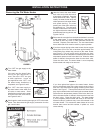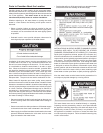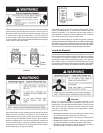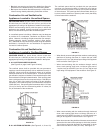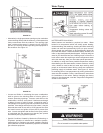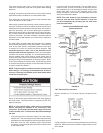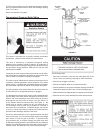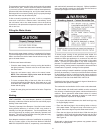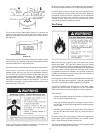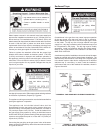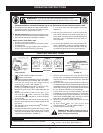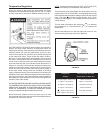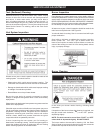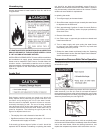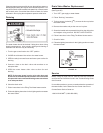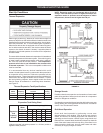
16
FIGURE 18.
The vent pipe from the water heater must be no less than the
diameter of the draft hood outlet on the water heater and must
slope upward at least 1/4 inch per linear foot (21 mm per meter).
See Figure 19.
FIGURE 19.
All vent gases must be completely vented to the outdoors of the
structure (dwelling). Install only the draft hood provided with the
new water heater and no other draft hood.
Vent pipes must be secured at each joint with sheet metal screws.
There must be a minimum of 6 inches (153 mm) clearance
between single wall vent pipe and any combustible material.
Fill and seal any clearance between single wall vent pipe
and combustible material with mortar mix, cement, or other
noncombustible substance. For other than single wall, follow
vent pipe manufacturer’s clearance specications. To insure a
tight t of the vent pipe in a brick chimney, seal around the vent
pipe with mortar mix cement.
Failure to have required clearances between vent piping and
combustible material will result in a re hazard.
Be sure vent pipe is properly connected to prevent escape of
dangerous ue gases which could cause deadly asphyxiation.
Chemical vapor corrosion of the ue and vent system may occur
if air for combustion contains certain chemical vapors. Spray can
propellants, cleaning solvents, refrigerator and air conditioner
refrigerants, swimming pool chemicals, calcium and sodium
chloride, waxes, bleach and process chemicals are typical
compounds which are potentially corrosive.
Gas Piping
Make sure the gas supplied is the same type listed on the
model rating plate. The inlet gas pressure must not exceed
14 inch water column (3.5kPa) for natural and propane gas (L.P.)
gas. The minimum inlet gas pressure listed on the rating plate
is for the purpose of input adjustment. If the gas control valve
is subjected to pressures exceeding 1/2 pound per square inch
(3.5kPa), the damage to the gas control valve could result in a
re or explosion from leaking gas.
If the main gas line shutoff serving all gas appliances is used, also
turn “OFF” the gas at each appliance. Leave all gas appliances
shut “OFF” until the water heater installation is complete.
A gas line of sufcient size must be run to the water heater.
Consult the current edition of National Fuel Gas Code ANSI
Z223.1/NFPA 54 and your gas supplier concerning pipe size.
There must be:
• A readily accessible manual shut off valve in the gas supply
line serving the water heater, and
• A drip leg (sediment trap) ahead of the gas control valve to
help prevent dirt and foreign materials from entering the gas
control valve.
• A exible gas connector or a ground joint union between
the shut off valve and control valve to permit servicing of
the unit.
Be sure to check all the gas piping for leaks before lighting the
water heater. Use a soapy water solution, not a match or open
ame. Rinse off soapy solution and wipe dry.
The minimum inlet gas pressure shown on the rating plate is that
which will permit ring at the rated input.



